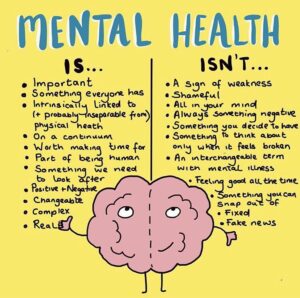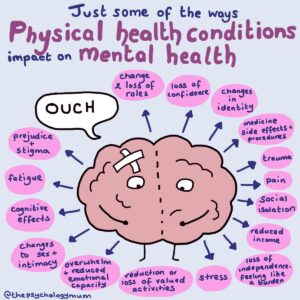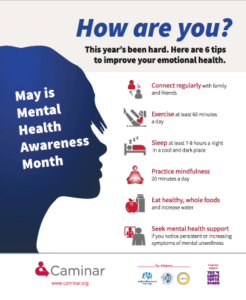What should you do if you are feeling not well or getting sad without any reason:
All over the world people are suffering from many problems some are suffering physically some are suffering mentally. Physical problems can be solved easily by doctors or by medicines but mental health problems are those which also required lots of effort from a patient as well. Mental problems are spreading with high speed every 3rd person in the world is suffering from mental illness. mental health problems like depression, anxiety, stress and mental illness. Before talking about the mental health that how can you maintain it first u should know what actually the mental health is.

What is mental health?
Mental health includes emotional, psychological, and social well-being. It affects how we think, feel, and act. It also helps determine how we handle stress, relate to others, and make healthy choices. Mental health is important at every stage of life, from childhood and adolescence through adulthood.

Why is mental health important as physical health:
Mental and physical health are equally important and they both contribute in maintaining our health. For example, depression increases the risk for many types of physical health problems, particularly long-lasting conditions like diabetes, heart diseases, and stroke. Similarly, the presence of chronic conditions can increase the risk for mental illness.

To create and maintain healthy relationships:
Meeting people and having conversations stimulate your mind to do better.
To enhance productivity:
Productivity and concentration are directly related to mental health. The more you work on your mental health, the more focused you become.
To increase retentively:
The better your mental health, the more powerful your memory is. If you want a sharp memory, work on your mental health first.
To live life to the fullest:
life is well lived if you are happy and fulfilling your potential. Mental Health helps you do just that.
To attain a better physical health:
Mind and body have a deep connection. Keep your mental good to live healthy.
To cope with stress:
Coping with stress becomes easier when you have a stable mind. You can analyze problems and work on solutions in a better way.
To attain a positive self-image:
Gain confidence and positivity by maintaining your mental health.
Can your mental health change over time?
Yes, it’s important to remember that a person’s mental health can change over time, depending on many factors. When the demands placed on a person exceed their resources and coping abilities, their mental health could be impacted. For example, if someone is working long hours, caring for a relative, or experiencing economic hardship, they may experience poor mental health.
Causes of mental health problems:
- Life stress (e.g. work, study or finance)
- Introverted personality
- Negative life experience
- Think too much
- Chemical imbalance in the brain.
- Genetic pre-disposition
- Interpersonal conflicts
- Punishment for the misdeed conducted by ancestors
- Cognitive and psychological disturbances
- Severe life stress
- Conflicts within the family
- Alcohol or drug use
- A family history of mental illness
- Not being able to cope or adjust to stress
- physical and biologic factors
- Physical Factors- Growth or tumour, in the brain, an injury to brain.
- Early Experiences- Negative experiences that occur early in life can lead to mental illness.
- Recent experiences
- Experiences that have occurred within a short amount of time and trigger mental illness.
- Homelessness
- Housing not stable, Accommodation at risk
- Financial difficulties
- Problems with neighbours
- Poor quality housing
How common is mental illnesses?
Mental illnesses are among the most common health conditions in the United States.
- More than 50% will be diagnosed with a mental illness or disorder at some point in their lifetime.
- 1 in 5 Americans will experience a mental illness in a given year.4
- 1 in 5 children, either currently or at some point during their life, have had a seriously debilitating mental illness.
- 1 in 25 Americans lives with a serious mental illness, such as schizophrenia, bipolar disorder, or major depression.
Early Warning Signs
Not sure if you or someone you know is living with mental health problems?
Experiencing one or more of the following feelings or behaviours can be an early warning sign of a problem:
- Eating or sleeping too much or too little
- Pulling away from people and usual activities
- Having low or no energy
- Feeling numb or like nothing matters
- Having unexplained aches and pains
- Feeling helpless or hopeless
- Smoking, drinking, or using drugs more than usual
- Feeling unusually confused, forgetful, on edge, angry, upset, worried, or scared
- Yelling or fighting with family and friends
- Experiencing severe mood swings that cause problems in relationships
- Having persistent thoughts and memories you can’t get out of your head
- Hearing voices or believing things that are not true
- Thinking of harming yourself or others
- Inability to perform daily tasks like taking care of your kids or getting to work or school.

Mental Health and awareness
Positive mental health allows people to:
- Realise their full potential
- Cope with the stresses of life
- Work productively
- Make meaningful contributions to their communities
Ways to maintain positive mental health include:
- Getting professional help if you need it
- Connecting with others
- Staying positive
- Getting physically active
- Helping others
- Getting enough sleep
- Developing coping skills

Treatment:
Psychotherapy
Psychotherapy is the therapeutic treatment of mental illness provided by a trained mental health professional. Psychotherapy explores thoughts, feelings, and behaviours, and seeks to improve an individual’s well-being. Psychotherapy paired with medication is the most effective way to promote recovery. Examples include: Cognitive Behavioural Therapy, Exposure Therapy, Dialectical Behaviour Therapy, etc.
Medication
Medication does not outright cure mental illness. However, it may help with the management of symptoms. Medication paired with psychotherapy is the most effective way to promote recovery.
Case management
Case management coordinates services for an individual with the help of a case manager. A case manager can help assess, plan, and implement a number of strategies to facilitate recovery.
Hospitalization
In a minority of cases, hospitalization may be necessary so that an individual can be closely monitored, accurately diagnosed or have medications adjusted when his or her mental illness temporarily worsens.
Self Help Plan
A self-help plan is a unique health plan where an individual addresses his or her condition by implementing strategies that promote wellness. Self-help plans may involve addressing wellness, recovery, triggers or warning signs.
Peer Support
Peer Support refers to receiving help from individuals who have suffered from similar experiences.
Author


